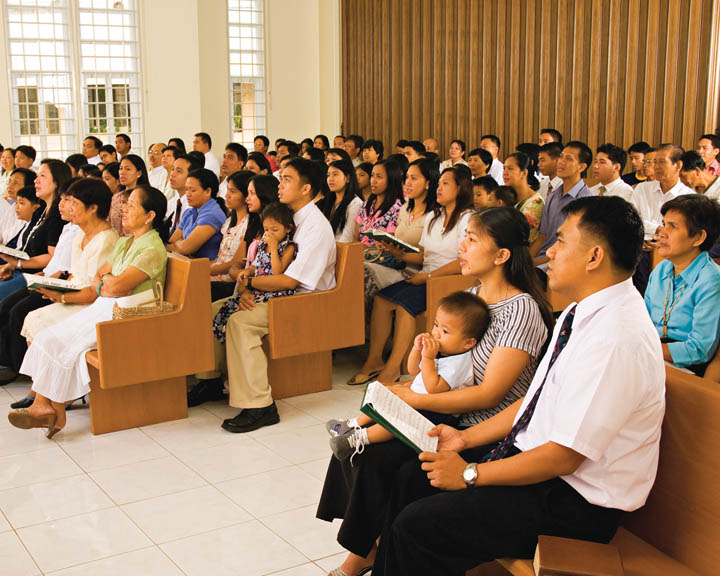In his article titled “Six Reasons Why Mormons Are Beating Baptists (In Church Growth) , dated 10 July 2012 which was posted on the patheos.com website, David French begins his article with the strong statement, “Our churches face a demographic crisis.” What he is speaking of is not so much a decline in actual church growth, but rather the losses that many Christian denominations are facing as numbers of their young people are beginning to leave their churches. In particular, French makes a stark comparison between the growth rate of youth in the Baptist Church and the growth rate of youth in the Mormon Church, noting that at a time when some youth are abandoning their church affiliations, the growth rate of youth membership in The Church of Jesus Christ of Latter-day Saints (often referred to as the Mormon Church) is consistently increasing.
In his opening comments he states:
Young people are leaving, even the Southern Baptist Convention is starting to lose members, and when you drill down deeper – comparing church attendance with population growth – the picture grows even more bleak. Simply put, when America’s fastest-growing religious segment is “nonreligious” we have a problem. [1]
 After compiling the results of a number of national studies, the Barna Group (an Evangelical Christian polling firm based in Ventura, California), published a list of six reasons why young evangelicals leave the Church. The six reasons that were listed are: the church is overprotective, their experience of Christianity is shallow, churches seem antagonistic to science, the church’s approach to sexuality is judgmental and simplistic, they wrestle with the exclusivity of Christianity, and the church feels unfriendly to those who doubt. [1]
After compiling the results of a number of national studies, the Barna Group (an Evangelical Christian polling firm based in Ventura, California), published a list of six reasons why young evangelicals leave the Church. The six reasons that were listed are: the church is overprotective, their experience of Christianity is shallow, churches seem antagonistic to science, the church’s approach to sexuality is judgmental and simplistic, they wrestle with the exclusivity of Christianity, and the church feels unfriendly to those who doubt. [1]
French states that those answers are unsurprising because:
Those are exactly the answers one would give leaving the kinds of churches that dominate modern evangelicalism — churches that combine nominally traditional doctrine with shallow commitment, rampant divorce and extramarital sex — all against a backdrop of extreme cultural hostility. In other words, we’re about 95% like the surrounding culture and hated for the 5% deviation. [1]
Members of The Church of Jesus Christ, or Latter-day Saints, live in the same country and interact with the same culture as members of other faiths and denominations (i.e. Baptists), yet the growth of the LDS Church is consistent – year by year and decade by decade. French proposes six reasons why he believes that this is the case:
Mormons have bigger families
French states that although this offers a simple and easy explanation, it is, by far, not the entire story. In fact, if family size were the sole determining factor, than every church in America should be growing at a rate that exceeds the general population growth, given the fact that the birth rate of religious families generally exceeds that of nonreligious families, however, that proves not to be the case. French believes that the real reasoning behind the fact that Mormons have larger families is that “Mormons start with a bigger baseline family, but then they tend to hold on to their kids while evangelicals often do not.” [1]
Mormons have lower divorce rates
 French points out that the divorce rate among regular church going couples is generally lower than that of secular couples. He also notes that Mormons who marry other Mormons have the lowest divorce rate of any other major religious group. There proves to be something of major noteworthy significance about families who pray together – they tend to stay together. French stated, “There are few things more demoralizing to a young Christian than seeing his Christian parents destroy their own marriage and destroy their own kids’ childhoods in a blaze of selfishness, lust, and pride.” [1]
French points out that the divorce rate among regular church going couples is generally lower than that of secular couples. He also notes that Mormons who marry other Mormons have the lowest divorce rate of any other major religious group. There proves to be something of major noteworthy significance about families who pray together – they tend to stay together. French stated, “There are few things more demoralizing to a young Christian than seeing his Christian parents destroy their own marriage and destroy their own kids’ childhoods in a blaze of selfishness, lust, and pride.” [1]
Mormons Evangelize
Latter-day Saint families base their lives on the principles and teachings of the Gospel of the Lord Jesus Christ. LDS parents know the importance of rearing their children in the nurture and admonition of the Lord. Prayer and scripture reading and scripture study are important essentials in their home to guide them in the direction that they should go – parents living as righteous examples before their children, and thus raising a righteous generation in Zion. One might say that in an LDS family, “evangelizing” starts in the home as parents endeavor to prepare their young children to one day go out and teach the Gospel to the world through their own righteous example of sharing the Gospel with others. Latter-day Saints follow the admonition given in The Book of Mormon (Another Testament of Jesus Christ), as recorded in 2 Nephi 25:26,
And we talk of Christ, we rejoice in Christ, we preach of Christ, we prophesy of Christ, and we write according to our prophecies, that our children may know to what source they may look for a remission of their sins.
 French relates that his wife used to argue on the doorstep with Mormon missionaries. However, after launching their website Evangelicals for Mitt, making new Mormon friends, and experiencing a constant flow of hate from a small group of those who oppose Mormons, he and his wife now welcome Mormon missionaries into their home, offer them rides in the rain, and make the effort to get to know a group of young people who experience a vastly different rite of passage than typical evangelical youth. He stated, “A Mormon mission is a sacrifice — a deep sacrifice — especially compared to the lives of evangelical youth. So not only does evangelism win converts, it also strengthens the faith of the evangelist.” [1]
French relates that his wife used to argue on the doorstep with Mormon missionaries. However, after launching their website Evangelicals for Mitt, making new Mormon friends, and experiencing a constant flow of hate from a small group of those who oppose Mormons, he and his wife now welcome Mormon missionaries into their home, offer them rides in the rain, and make the effort to get to know a group of young people who experience a vastly different rite of passage than typical evangelical youth. He stated, “A Mormon mission is a sacrifice — a deep sacrifice — especially compared to the lives of evangelical youth. So not only does evangelism win converts, it also strengthens the faith of the evangelist.” [1]
Mormons are Orthodox
French acutely observes that Mormons are not:
“orthodox” in the “Apostles’ Creed, no books but the Old and New Testament” sense, but they are orthodox within their own faith tradition. In other words, members of a Mormon church tend to know and believe their faith. [1]
French further claims that is not necessarily true in most evangelical churches. There is a wide divergence that seems to exist. He further stated that nationally, 84 million people profess to be Evangelical Christians, but of that number, only 19 million actually have orthodox evangelical beliefs. “In other words, the evangelical church does a pathetic job in transmitting even the most basic Romper Room-simple elements of the Christian faith from generation to generation.” [1]
Mormon leaders ask a lot of their members
French noted that involvement in the LDS Church by its members is at a much higher level than that of members of evangelical congregations. Mormons, he observes, are doing much more. Members of The Church of Jesus Christ give unselfishly of their time, talent, and abilities through giving, service to others, and magnifying their individual Church callings and responsibilities. They are taught from the words of King Benjamin in The Book of Mormon (Another Testament of Jesus Christ) that “when ye are in the service of your fellow beings ye are only in the service of your God” (Mosiah 2.17.) He also stated:
. . . .compared to the Mormon experience, an evangelical church is a carnival ride of short services, low accountability, and zero church discipline. If you’re a faithful Mormon, you’re not living a 95% secular life like so many evangelicals. A Mormon is truly countercultural. [1]
Mormons are less selfish
French believes that Evangelicals have forgotten the basic fundamental paradox of scripture, “For whosoever will save his life shall lose it; but whosoever shall lose his life for my sake and the gospel’s, the same shall save it” (Mark 8:35). He says that Evangelicals ask their kids to lose just a little life, but to gain what exactly? “For what shall it profit a man, if he shall gain the whole world, and lose his own soul? Or what shall a man give in exchange for his soul?” (Mark 8:36, 37.)
French brings his article to a close with the following conclusions:
If Christianity isn’t worth losing everything, is it worth only losing some things? And if it’s not worth losing everything, why is it worth losing anything? Mormons remember the biblical equation. Evangelicals forget it. Mormons prosper. Evangelicals falter. Big families, intact families, years-long missions, faithfulness to church teaching (rather than believing that you can customize your own theology), and a lifetime of service add up to a sustainable, Christ-honoring counterculture. By contrast our small family, increasingly-divorced, mission-free, theologically diverse, and consumer-oriented church will prove to be ashes and dust — unable to resist a culture that relentlessly demonizes even the small remaining differences between evangelicals and atheists. [1]
Additional Resources:
Basic Mormon Beliefs and Real Mormons
The Lord Jesus Christ in Mormonism
About Keith L. Brown
Keith L. Brown is a convert to The Church of Jesus Christ of Latter-day Saints, having been born and raised Baptist. He was studying to be a Baptist minister at the time of his conversion to the LDS faith. He was baptized on 10 March 1998 in Reykjavik, Iceland while serving on active duty in the United States Navy in Keflavic, Iceland. He currently serves as the First Assistant to the High Priest Group for the Annapolis, Maryland Ward. He is a 30-year honorably retired United States Navy Veteran.



